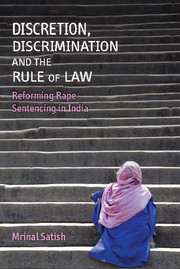Book contents
- Frontmatter
- Dedication
- Contents
- Acknowledgements
- Abbreviations
- 1 Introduction
- 2 An Introduction to the Indian Criminal Justice System
- 3 The Law and Practice of Rape Adjudication in India
- 4 Rape Sentencing: An Empirical Analysis
- 5 Myths and Stereotypes in Rape Prosecutions
- 6 Structuring Sentencing Discretion: Guideline Models and Approaches
- 7 Sentencing Discretion in India: The Need for Structuring
- 8 Sentencing Guidelines for Rape
- Appendix 1 List of Cases Studied for Empirical Analysis
- Appendix 2 Templates of Format Used for Medical Examination of Rape Victims
- Appendix 3 Overview of Variables Considered for Empirical Study and Data Obtained
- Appendix 4 Output of Regression Analysis
- Appendix 5 Charts
- Table of Cases
- Bibliography
- Index
1 - Introduction
Published online by Cambridge University Press: 23 July 2017
- Frontmatter
- Dedication
- Contents
- Acknowledgements
- Abbreviations
- 1 Introduction
- 2 An Introduction to the Indian Criminal Justice System
- 3 The Law and Practice of Rape Adjudication in India
- 4 Rape Sentencing: An Empirical Analysis
- 5 Myths and Stereotypes in Rape Prosecutions
- 6 Structuring Sentencing Discretion: Guideline Models and Approaches
- 7 Sentencing Discretion in India: The Need for Structuring
- 8 Sentencing Guidelines for Rape
- Appendix 1 List of Cases Studied for Empirical Analysis
- Appendix 2 Templates of Format Used for Medical Examination of Rape Victims
- Appendix 3 Overview of Variables Considered for Empirical Study and Data Obtained
- Appendix 4 Output of Regression Analysis
- Appendix 5 Charts
- Table of Cases
- Bibliography
- Index
Summary
‘If the criminal law as a whole is the Cinderella of jurisprudence, then the law of sentencing is Cinderella's illegitimate baby.’
—Nigel WalkerBackground to the Project
Professor Nigel Walker succinctly sums up the neglected state of sentencing in most parts of the world – be it the attention given to sentencing in judicial decisions, law reform initiatives, or in legal literature – when he refers to sentencing as ‘Cinderella's illegitimate baby’. The Indian criminal justice system presents a classic example of such neglect. As Justice Chinnappa Reddy acknowledges, in most criminal appeals, the Supreme Court confines itself to statutory interpretation or to issues of fact determination. It seldom discusses important jurisprudential issues relating to sentencing. This approach of the Court has led to criminal law in India becoming static, particularly with respect to sentencing. The Court has failed to provide guidance to subordinate courts on sentencing, being satisfied in ruling simply that the sentence should be determined according to the facts and circumstances of each case and that it is not possible to prescribe a straitjacket formula for sentencing. Only in the context of the death penalty has the Court laid down broad guidelines for judges to follow in determining whether an offender convicted of a capital crime should receive a sentence of death.
The Executive and the Legislature, likewise, have not paid much attention to the state of criminal sentencing in India. In 2003, the Government of India set up a committee with the mandate to study the Indian criminal justice system and suggest suitable amendments to laws. This committee, headed by Justice V. S. Malimath, recommended, inter alia, the enactment of a law prescribing sentencing guidelines, and the establishment of an expert statutory body to draft such guidelines. Although some other recommendations made by the Justice Malimath Committee were enacted into law, there was no action on the recommendation for sentencing guidelines. Four years later, another committee, this time headed by Professor N. R. Madhava Menon, also recommended the enactment of sentencing guidelines. The recommendation of this committee was also disregarded. One weakness of the recommendations made by both these committees (in relation to sentencing reform) was that they were not based on a systematic study of sentencing in India.
- Type
- Chapter
- Information
- Discretion, Discrimination and the Rule of LawReforming Rape Sentencing in India, pp. 1 - 14Publisher: Cambridge University PressPrint publication year: 2016



